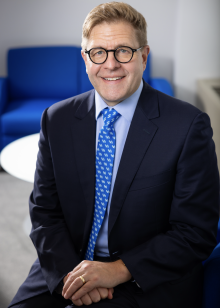
Meet the Dean
Jeff Grabill stepped into the role of dean of the College of Arts and Sciences, the largest academic unit at UB, on Aug. 1. Prior to coming to UB, Grabill served as deputy vice chancellor for student education at the University of Leeds in the United Kingdom. Before his time at Leeds, Grabill was at Michigan State University for nearly 20 years, serving as a professor and former chair of the Department of Writing, Rhetoric and American Cultures, and as associate provost for teaching, learning and technology.
A recognized leader in higher education, Grabill brings a strong track record of academic innovation, institutional leadership and interdisciplinary collaboration.
Get to know Dean Jeff Grabill, PhD

Two reasons, really. First, I have always been interested in opportunities where there was something at stake intellectually, and this includes my leadership roles. There is something at stake in leading a college of arts and sciences at this moment in time. As I think we all understand, this moment matters for the liberal arts and sciences and for higher education more broadly.
Second, and this really matters to me, UB was described as a place where people were genuinely kind and collaborative. Kindness is a powerful virtue, and genuine collaboration a transformative practice.
I was asked a version of this question about a decade ago in the form of “why do you stay in higher education,” and my gut response then is probably my best and most honest response today. In no other line of work is it possible to work every day with some of the most creative and imaginative minds in the world. For me, that dynamic has always been enough to leap out of bed in the morning.
I’ve been fortunate to work in two very different higher education systems and to be exposed in a meaningful way to a few others. I’m convinced that the American liberal arts model provides the most transformational education for students and serves them particularly well for the long term. There is both breadth and depth in this approach to higher education, and that has durable value.
I believe deeply in what we do in higher education, both our research and creative work and our educational experiences and outcomes. We are transformative because of the people, the relationships we create, and how we learn and grow from being in relationship with each other.
It is true that higher education is overwhelmingly beneficial for individuals and societies. That value in the College and UB is a function of the impressive research we produce and its impact. That value is also a function of our work with students. The more we can excite students about learning, care about and for them, and provide experiences that enable them to pursue their goals and dreams, the more we will provide an education that is distinctive and meaningful.
We face a chaotic funding, policy, and cultural environment in higher education right now. I know that many feel unsettled and unsure. But the wonder of higher education — and yes, I think we do things full of wonder — resides in us. It is located in the relationships between and among students, staff, and faculty.
The message is that it is the people and relationships that matter. The next few years in U.S. higher education are going to be tough. We need to be brave. And kind.
My non-work reading list tends to underwhelm people — my work reading list probably would as well. I mostly read spy novels — I fancy myself North America’s foremost expert on the literary espionage novel, a category that might only have one candidate. Having said that, I am finally catching up with "The Overstory" by Richard Powers, and have found that book deeply moving.
I listen to lots of podcasts. While living in the U.K., I got interested in how a company — in this case, the British East Indian Company — could lead the growth of an empire, so I started listening to "Empire" with Anita Anand and William Darlymple. Staying that side of the pond, I’ve enjoyed "The Rest is Politics." I enjoy Michael Lewis’s work and so enjoy his podcast "Against the Rules" as well. "99% Invisible" is always a good listen. More broadly, I enjoy good interview podcasts with creative people, and these sorts of podcasts tend to come and go. Good interviewing is a rare art.
When my son was about 15, he asked me why I gave up playing golf. The answer was “you.” My children’s very active schedule killed the few free time hobbies and interests I had (I didn’t love golf, but I did enjoy brewing beer). I enjoyed the time with them much more than my hobbies.
I am sadly boring with no special talents, but I was the Punt, Pass, and Kick Champion in the third grade in Lowell, Indiana.
For fun, [my wife] Chandra and I mostly eat, so we are really looking forward to finding all the fun food places that Buffalo has to offer. We also learned to love walking/hiking in the U.K., and we have bikes to ride, so the walking and biking options in Western New York are on our agenda.
Honestly, my answers to the first two questions are what excite me the most. I think there are some important issues to work through and ideas to explore. And I really enjoy helping my colleagues and students develop and thrive.
